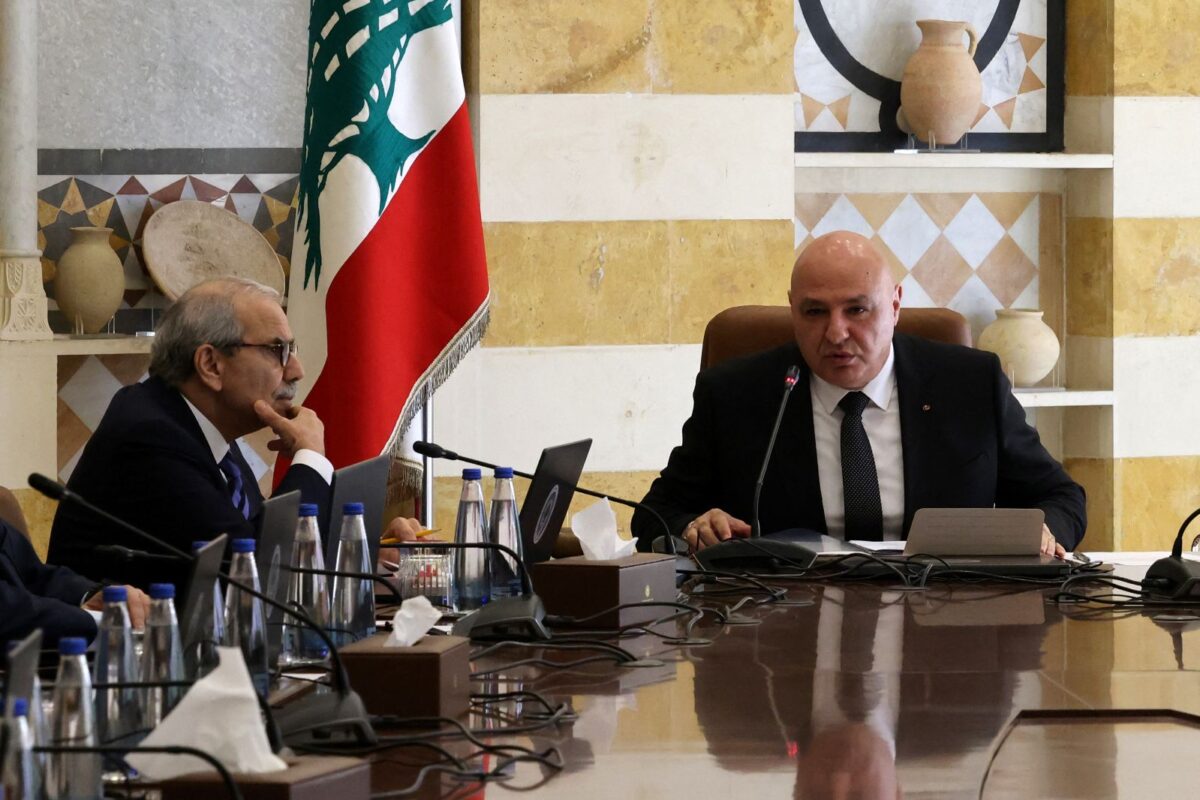
When President Joseph Aoun was inaugurated, he spoke with rare moral clarity. He promised that Lebanon would have one army, one authority, and one sovereignty, that the state would be the sole bearer of arms. It was the kind of statement the country had not heard in years, a reminder that leadership could still mean principle rather than survival.
In the months that followed, his government appeared to move from words to structure. Decisions on August 5 and August 7, made in his presence, sought to reassert the state’s monopoly on arms. A month later, the army introduced a plan outlining the practical path toward that goal. For a brief moment, it seemed Lebanon might reclaim its right to act as a state rather than as a hostage to militias.
But then came the Raouche episode, a direct and public challenge to that very authority.
A Challenge Written on Stone
When Hezbollah projected the faces of Hassan Nasrallah and Hashem Safieddine on Raouche Rock, it was a declaration not an act of commemoration. The state’s word means little, and its bans are optional. The Prime Minister’s orders were ignored, the army and police did not intervene, and the President, who had vowed to restore state authority, returned from New York to find it slipping through his fingers.
Hezbollah’s Wafiq Safa went further, publicly thanking Army Commander General Haykal for ensuring that the event went “smoothly.” It was a masterstroke of symbolic politics; a message that Hezbollah can defy the state while still co-opting its institutions.
This was not courtesy; it was choreography.
From Principle to Paralysis
President Aoun’s restraint may come from noble intent. He wants to be a unifier, not an instigator; a president who leads with reason rather than confrontation. But the gap between principle and power has become his presidency’s defining feature.
In political psychology, moral restraint without deterrence does not inspire trust; it invites defiance. Hezbollah reads his patience as permission. By choosing to rise above the political fray, Aoun has allowed the same actors he seeks to transcend to erode the very authority he represents.
His dilemma is structural but also deeply personal. The system he inherited is fractured, but his instinct for balance has made him appear indecisive. Every gesture toward consensus ends up strengthening those who thrive on division.
The Strategy of Exploitation
Hezbollah and Amal have perfected the art of selective engagement with the state. When it suits them, they praise the president and the army; when it doesn’t, they attack the Prime Minister or the judiciary. They alternate between deference and defiance, keeping institutions off balance and forcing each branch of government to compete for their approval.
This is divide-and-rule politics disguised as pragmatism. It fractures the very institutions that might one day hold them accountable.
Their latest move — opposing diaspora voting for all 128 parliamentary seats — is a clear example. Their reasoning is simple: they cannot campaign abroad, and the diaspora vote puts them at a disadvantage. But the deeper message is that Hezbollah and Amal only accept democracy when it is geographically constrained; when it happens within the zones they can control.
The same logic applies internally. When the Prime Minister’s authority was challenged and publicly insulted, the goal was not just to weaken him personally but to reaffirm that ultimate power lies elsewhere.
A President Misreading His Opponent
Aoun’s approach — appealing to conscience and national unity — works in a political culture where actors share a minimum respect for statehood. Hezbollah does not. It sees the state as a tool, not a framework. Its participation in government is instrumental, designed to protect its parallel sovereignty, not to dissolve it.
By insisting on moral high ground, Aoun is trying to govern through moral legitimacy, while Hezbollah governs through functional legitimacy, which is the ability to get things done, even if unlawfully. In a country exhausted by crisis, the second often outshines the first.
In psychological terms, this is a battle between normative authority and performative authority. Aoun represents the former, the authority of principle and legality. Hezbollah represents the latter, the authority of action and results. The tragedy is that Lebanon’s public sphere increasingly rewards performance over principle.
The Cost of Pleasing Everyone
The President’s refusal to alienate any camp is understandable. Lebanon’s sectarian mosaic demands balance. But in trying to please everyone, he risks pleasing no one. Reformists see hesitation where they expected courage; Hezbollah’s base sees tolerance where they expected resistance.
This is not to dismiss Aoun’s decency or intent. It is to recognize that leadership in a captured state requires more than moral language, it requires confrontation. Because a group that rejects the very notion of statehood cannot be appeased into cooperation; it must be contained by institutions that dare to assert themselves.
The Final Reckoning
What the Raouche incident revealed was not just Hezbollah’s defiance but the fragility of Lebanon’s sovereignty. The state’s highest offices, the presidency, the premiership, and the security establishment, no longer act in concert. And that fragmentation is precisely the environment in which Hezbollah thrives.
President Aoun’s legacy will not be measured by his intentions but by whether he managed to restore the meaning of the state he vowed to defend. So far, the answer remains uncertain. But one truth is clear: Hezbollah does not want to share in building a strong state. It needs a weak one to survive. And a presidency that refuses to confront that truth risks becoming the moral alibi for its undoing.
Ramzi Abou Ismail is a Political Psychologist and Senior Research Fellow at the Institute for Social Justice and Conflict Resolution at the Lebanese American University.
The views in this story reflect those of the author alone and do not necessarily reflect the beliefs of NOW








